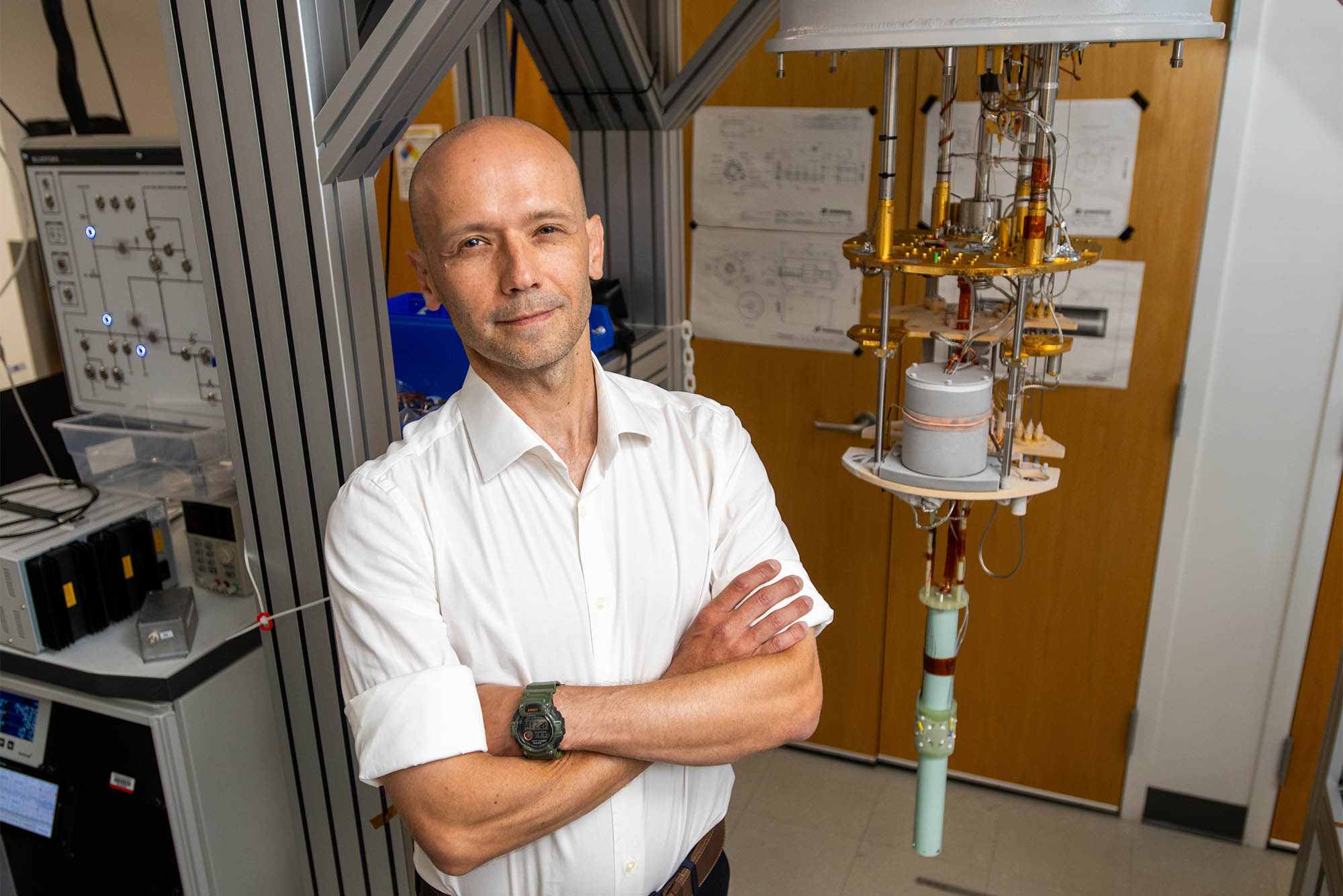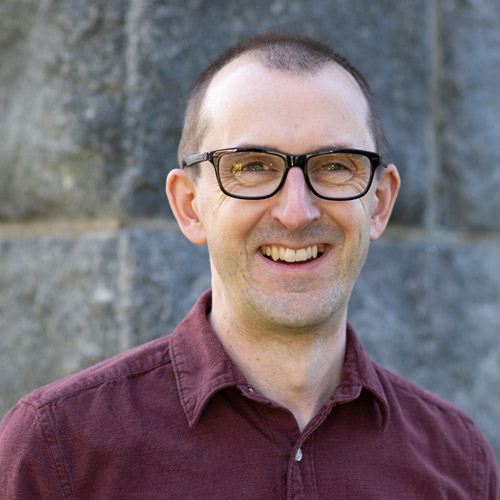BU Dark Matter Researcher Wins Award to Drive “Extraordinary Contributions” to Experimental Physics

BU physicist Alex Sushkov is part of the Moore Foundation’s 2023 cohort of Experimental Physics Investigators. Photo by Diana Saville
BU Dark Matter Researcher Wins Award to Drive “Extraordinary Contributions” to Experimental Physics
Gordon and Betty Moore Foundation names Alex Sushkov to list of distinguished experimental physicists
Dark matter might be one of the most important substances in the universe—the glue that stops stars flying away from each other and ripping galaxies apart. It’s also one of the most mysterious. For a start, it’s proven so stubbornly hard to see that researchers can only guess at its existence. They know there’s something out there binding everything together, but it doesn’t reflect light or emit energy, so they can’t pin it down. And yet, judging by its gravitational effects, scientists estimate this elusive dark matter makes up around 85 percent of all matter in the universe.
Boston University physicist Alex Sushkov is one of those trying to find a way to see it. And his efforts might have benefits down here on Earth too. The techniques he’s using to better peer into the void could help improve magnetic resonance imaging (MRI), which is used to diagnose cancer, brain injuries, heart disease, and more. It’s work Sushkov hopes to accelerate thanks to a new award from the Gordon and Betty Moore Foundation.
The California-based foundation has named Sushkov, a BU College of Arts & Sciences associate professor of physics, to its 2023 cohort of Experimental Physics Investigators. The recognition is given to a select group of distinguished scientists who the organization hopes will make “extraordinary contributions to the field of experimental physics.” Sushkov will receive $1.25 million over the next five years to help drive his work on improving the sensitivity of nuclear magnetic resonance detection, an imaging technique used to study the nuclei of atoms.
The Moore Foundation, established in 2000 by Intel cofounder Gordon Moore and his wife, says the goal of its Experimental Physics Investigators Initiative is to “advance the scientific frontier in experimental physics” and support “experimental physicists who may lack flexible research funding to tackle their most creative research ideas.” It also celebrates researchers who promote equitable and inclusive access to the field.
The Brink spoke with Sushkov, who is also affiliated with BU’s Photonics Center and the Rafik B. Hariri Institute for Computing and Computational Science & Engineering, about the award, his research, and making science more inclusive.
Q&A
With Alex Sushkov
The Brink: What’s the one big research question you’d love to answer or scientific mystery you want to solve?
Sushkov: One scientific mystery that we would like to resolve is the nature of dark matter. If we succeed in developing quantum-limited nuclear magnetic resonance detection, we will be able to mount a sensitive search for ultralight axion dark matter. A discovery may solve several of the mysteries facing today’s physicists, including the nature of dark matter, providing insights into the earliest epochs of the universe and into fundamental physics at the highest energy scales.
The Brink: How might your work change the lives of people reading this?
Sushkov: One potential impact of our work is on the field of nuclear magnetic resonance and its well-established applications. Specifically, our technology may improve MRI and spectroscopy. One can imagine a portable and affordable MRI machine, which enables accessible noninvasive imaging and diagnostics.
The Brink: What does this recognition from the Moore Foundation mean to you and your team?
Sushkov: This recognition serves as validation for the hard work, dedication, and intellectual effort that our lab puts into our research endeavors. It is an acknowledgement that our contributions are making a positive impact on our field of research. This boosts team morale and motivation, inspiring team members to continue pushing boundaries, striving for excellence, and taking on new challenges. We are also hoping that this recognition attracts new talented individuals who want to contribute and bring fresh perspectives to our research. We are excited to leverage this award to accelerate our progress toward new technologies and discoveries.
The Brink: What will this award—that supports creative and innovative research ideas—allow you to do that other funding might not?
Sushkov: Creative and innovative research ideas are inherently risky. This award supports projects that have a higher degree of uncertainty, but also greater potential for groundbreaking discoveries. Traditional funding sources are usually more risk-averse. The long-term nature of the support allows pursuit of a vision that does not necessarily fit neatly into existing research categories.
The Brink: The grant also aims to promote a culture of inclusion and equitable access—how will you do that? How does having a diverse team help advance your science and the field?
Sushkov: A diverse team brings together individuals with different life experiences, cultural backgrounds, and perspectives. This diversity of thought can lead to more creative problem-solving and innovative approaches to research challenges. Exposure to a variety of viewpoints stimulates creativity and fosters the generation of new ideas. Diverse teams are more likely to approach problems from multiple angles, leading to richer and more comprehensive solutions. A diverse team is better equipped to communicate and connect with a wider audience, ensuring broader outreach. Our team’s diversity is enabled by inclusive recruitment, a supportive and productive lab culture, and strong mentorship and support for each team member.
The Brink: What advice would you have for younger scientists who want to follow in your footsteps?
Sushkov: Cultivate curiosity and passion for your work. These drive us to explore deeper, ask meaningful questions, and stay motivated, even during inevitable challenges. Develop critical thinking skills. Learn to question assumptions, analyze data objectively, and approach problems from multiple angles; this skill is crucial for generating innovative ideas and solving complex challenges. Honest and effective communication is important. Develop the ability to explain complex concepts clearly to both scientific and nonscientific audiences. This includes writing research papers, giving presentations, and engaging in public outreach.
Finally, have fun.

Comments & Discussion
Boston University moderates comments to facilitate an informed, substantive, civil conversation. Abusive, profane, self-promotional, misleading, incoherent or off-topic comments will be rejected. Moderators are staffed during regular business hours (EST) and can only accept comments written in English. Statistics or facts must include a citation or a link to the citation.